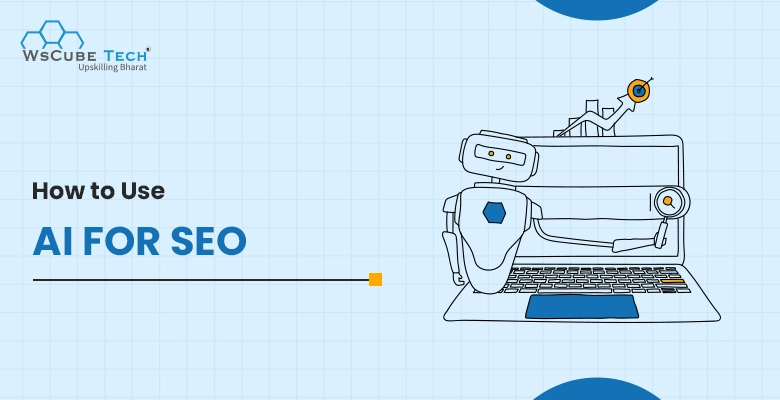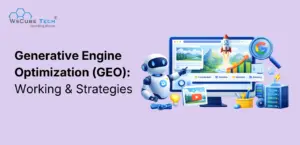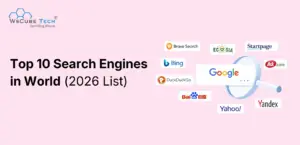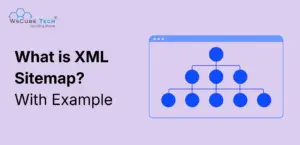Search engines have evolved, and so must we. In today’s fast-paced digital landscape, SEO is not merely about keyword stuffing or link building but involves making smarter, data-backed decisions that help websites rank faster and stay ahead of the curve. Hence, AI steps in as a tool to automate tasks and as a strategic partner in your SEO journey.
Whether you're managing a content team, optimizing your own website, or scaling up your SEO agency, AI can help you spot keyword trends, streamline workflows, and generate content ideas faster than ever.
But how to use AI for SEO without losing control or sacrificing quality?
Well, you need to ensure that every piece of AI-assisted content aligns with your brand’s voice, connects with your audience, and delivers real results. Rather than letting AI take over, you use it to work smarter.
This blog will explore how to blend AI’s analytical power with human creativity to improve every aspect of your SEO strategy, be it keyword research, content creation, on-page SEO, link building, or technical SEO audits.
Ready to turn AI into your SEO secret weapon? Let’s dive in.
What is AI for SEO?
AI SEO refers to using artificial intelligence to enhance SEO efforts and automate various SEO processes, such as content optimization, keyword research, competitor analysis, and performance tracking.
AI evaluates different patterns in datasets to find what affects ranking. You don’t need to manually complete SEO activities but can use Artificial Intelligence for SEO to analyze large datasets, get actionable insights, and predict ranking opportunities.
How AI can impact SEO:
SEO Automation - AI tools streamline repetitive and time-consuming tasks, such as link building, technical audits, and competitor research.
Search Intent Analysis - You can use AI to understand what users want based on their queries.
Predictive Ranking Analysis - Use AI to identify keywords that can bring the highest ROI based on search results.
Smarter Recommendations - AI can suggest unique topics, relevant keywords, and best optimizations based on top-ranking pages.
Recommended Professional Certificates
Digital Marketing Mentorship Program
Advanced AI Marketing Bootcamp
Performance Marketing Bootcamp
SEO Specialist Bootcamp
How to Use AI for SEO?
Integrating AI into your SEO strategy isn’t just smart; it’s necessary. With search engines evolving rapidly, leveraging AI tools can help you stay competitive, save time, and get better results. Here are methods to use AI for SEO to transform each stage of your workflow:
1. Competitor Analysis
AI transforms competitor analysis into a smart, real-time strategy. You no longer have to manually scan websites and guess what works, but you can use AI tools to get deep insights into what your competitors are ranking for, how they structure their content, and what backlink strategies they use. This means you can reverse-engineer their success and find opportunities they’ve missed.
Tips:
- Use AI-powered SEO platforms (e.g., Ahrefs, Crayon) to discover keyword overlaps and domain-level competitors.
- Analyze top-ranking content to find their average word count, structure, and keyword density.
- Let AI identify emerging patterns, such as increased use of schema markup or video content.
- Track ranking shifts over time to see which strategies are gaining or losing effectiveness.
2. Keyword Research
Keyword research is no longer about just volume; it’s about context, intent, and timing. When you use AI for SEO optimization, it analyzes search behavior, trends, and competitive landscapes to reveal which keywords will drive the most value. You also get access to keyword clusters and semantic suggestions that support better topic authority. However, you manually need to check keywords suggested by AI tools to use only relevant and targeted keywords. To learn nuances of SEO and keyword research, join our SEO course.
Tips:
- Use AI platforms like ChatGPT or Surfer SEO to find long-tail keywords and search questions users are asking.
- Group keywords based on search intent to match users at different funnel stages.
- Analyze seasonality and real-time interest with AI to spot emerging keyword trends.
- Prioritize keywords using AI’s scoring metrics that weigh competition, traffic, and potential ROI.
3. Content Ideation
Struck by writer’s block? AI is your brainstorming partner. It can analyze your niche, competitors, and even current events to suggest relevant, high-performing content ideas. Hence saving time and helping you stay relevant to your audience’s interests and search demand.
Tips:
- Prompt AI to generate topic clusters around your core keywords to build authority and content depth.
- AI can scan competitor content and public forums to uncover gaps and trending questions.
- AI tools like Jasper or Frase can create briefs or outlines for new blog posts or landing pages.
- Ask AI to suggest alternative formats for existing content. For example, turning a blog into a checklist, video script, or carousel.
No Masterclass found!
4. Content Optimization
Great content needs more than creativity; it needs strategic refinement. AI helps you identify missing keywords, improve readability, and enhance flow. Whether you're updating old content or fine-tuning a draft, AI tools can elevate it to match (or beat) the competition.
Tips:
- Use tools like Clearscope or MarketMuse to compare your content with top-ranking pages and fill semantic gaps.
- Get AI recommendations for improving grammar, transitions, and paragraph structure.
- Adjust tone, complexity, or style to ensure it resonates with your target reader.
- Maintain a natural, non-spammy tone by allowing AI to balance keyword placement and density.
5. Optimizing Meta Tags and Headers
Next on how to use AI for SEO optimization is meta tags and headers optimization. Meta tags and headers may seem minor, but they play a big role in both SEO and user engagement. AI ensures that your metadata is compelling, keyword-optimized, and within the proper character limits, while your headers guide both readers and search engines through the content logically.
Tips:
- Let AI write or refine SEO-friendly title tags and meta descriptions that increase click-through rates.
- Use AI to ensure relevant keywords are placed naturally in H1, H2, and H3 tags.
- Create headline variants and test them for emotional appeal, clarity, and performance.
- Keep your content scannable with well-structured headers that break complex topics into digestible parts.
6. Image Creation
Visuals are essential for keeping users engaged and breaking up long blocks of text. However, creating unique, high-quality images takes time unless you're using AI. From featured images and infographics to blog banners and social media visuals, AI tools can generate professional-grade visuals tailored to your content’s theme and tone.
Tips:
- Use tools like DALL·E, Midjourney, or Canva AI to generate custom images based on your content topic.
- Create SEO-friendly images with relevant alt text and file names using AI-generated suggestions.
- Design infographics and charts that visually represent complex ideas pulled from your article.
- Let AI tools resize and reformat images for faster loading across devices, which is crucial for Core Web Vitals.

7. Schema Markup Generation
Schema markup helps search engines understand your content better and can increase your chances of earning rich results. However, writing schema manually is technical and time-consuming. AI can auto-generate schema code for your articles, FAQs, products, events, and more in just seconds.
Tips:
- Use AI to generate accurate and structured JSON-LD markup tailored to your content type (e.g., Article, FAQ, Product).
- Implement schema for rich snippets like star ratings, recipe cards, how-tos, or event details.
- Validate your AI-generated schema with Google’s Rich Results Testing Tool before publishing.
- Update older content with schema markup using AI tools to improve its search visibility and CTR.
8. Internal Link Building
Internal links enable search engines to crawl your site and boost user experience, but manually inserting them is tedious and prone to errors. Hence, use artificial intelligence for SEO, which can scan your content and suggest or even insert the most relevant internal links automatically, improving navigation and spreading link equity.
Tips:
- AI tools can analyze your site structure and recommend relevant internal linking opportunities.
- Automatically insert internal links in new content using AI to point to high-value or related pages.
- Ensure a balanced internal linking strategy, as AI helps avoid overlinking to the same URLs.
- Maintain proper anchor text variation with AI-generated suggestions that match the context naturally.
9. Technical SEO
Technical SEO is crucial for crawlability, speed, and indexing, but it can get highly complex. AI simplifies technical audits by identifying issues with mobile usability, page speed, duplicate content, broken links, and more. It not only flags issues but also offers fixes.
Tips:
- Use AI-driven tools like Screaming Frog (with ChatGPT integrations), Sitebulb, or PageSpeed Insights with AI enhancements for comprehensive technical audits.
- Monitor and improve site performance and load speed using AI-generated optimization tips.
- Let AI detect duplicate or thin content that may harm your rankings.
- Identify crawl issues, indexation errors, or broken links quickly and prioritize fixes based on impact.
Explore Key SEO Topics That You Should Know
10. Identifying Site Errors and Crawl Issues
The last use of AI in SEO is for detecting and reporting hidden issues that impact SEO before they become serious problems. From crawl errors and redirect loops to missing alt text or broken scripts, AI can keep your site healthy and SEO-ready around the clock.
Tips:
- Run regular AI-powered scans to catch 404 errors, redirect chains, or JavaScript rendering issues.
- Get AI-generated summaries with prioritized issue lists based on SEO impact.
- Set up alerts for ongoing health checks as AI can notify you when new crawl errors or bugs appear.
- Use AI to resolve common issues faster by generating fix-ready recommendations or even code snippets.
Checklist for Using Artificial Intelligence for SEO
Effectively incorporate AI into your SEO efforts by following these steps:
1. Establish Clear Content Goals
Before diving into AI tools, know exactly what you want to achieve, such as more traffic, better engagement, and higher conversions. Clear goals help you train AI models and prompt them effectively. Whether it's boosting topical authority or filling content gaps, goal clarity ensures your efforts stay focused and results-driven.
2. Enhance Creativity with Human Expertise
AI can suggest and scale ideas, but your human touch adds authenticity, emotion, and brand personality. So, when you use AI for SEO, make sure to blend AI efficiency with your unique voice, storytelling, and audience insights to create content that resonates deeply and builds trust, not just rankings. Master SEO and digital marketing skills by signing up for our digital marketing course.
3. Choose Topics Based on Audience Intent
Don’t just chase keywords; understand why your audience is searching. Use AI to analyze behavior patterns, search queries, and content gaps, then craft topics that meet their needs at every stage of the journey. Relevance always beats volume.
4. Implement Constant Monitoring
SEO isn't a set-it-and-forget-it game. Use AI tools to continuously track rankings, keyword trends, and technical health. Real-time monitoring means you can adapt faster, fix issues early, and optimize content before your competitors even notice a shift.
5. Configure AI Profiles and Prompts
The better you guide your AI, the better the output. Set clear brand guidelines, tone preferences, and SEO priorities in your prompts or AI profiles. Tailored instructions result in content that’s aligned, consistent, and ready to publish.
6. Ensure Continuous Improvements
AI thrives on iteration. Keep refining your prompts, updating keyword data, and improving content based on performance insights. Use A/B testing and feedback loops to evolve your strategy and let both AI and your results improve over time.

FAQs About Use of AI in SEO
AI is a game-changer for SEO because it saves time and enhances your strategy with smarter, data-driven decisions. Instead of spending hours on tasks like generating schema markup or analyzing keyword trends, AI tools can handle them in seconds, allowing you to focus on strategy and creativity. It’s like having an assistant that never sleeps and constantly learns.
AI should be a support tool, not the main content creator. Use it to outline content, draft sections, or suggest ideas but always refine and humanize your final content. Adding personal expertise, industry knowledge, and real-life examples is what turns decent AI content into great SEO content.
There are many smart ways to put AI to work for your SEO efforts:
-Keyword research
-Competitor analysis
-Content ideation
-Image creation
-Optimizing content and meta tags
-Finding crawl issues
Use AI when you want to:
Speed up repetitive SEO tasks
Explore data-driven insights quickly
Generate content frameworks
Analyze competitors without manual effort
Scale your strategy without scaling your team
Google doesn’t penalize content just because it’s AI-generated. What matters is whether the content is helpful, original, and written for people and not just search engines. Google’s focus is on E-E-A-T (Experience, Expertise, Authoritativeness, and Trustworthiness), so AI should support content creation, not replace the human voice behind it.
AI content can work well if it’s edited, optimized, and aligned with search intent. But publishing AI-written content as-is could hurt your rankings if it’s low quality or inaccurate. The best practice? Use AI to brainstorm ideas, create outlines, and speed up writing, then add your insights to make the content helpful and trustworthy.
Some of the most popular and effective AI SEO tools include:
ChatGPT – for keyword ideas, outlines, meta tags, and prompt-based SEO content
Jasper – for marketing copy, blog content, and SEO writing
Surfer SEO – for real-time content optimization based on SERP analysis
Frase – for building content briefs and optimizing on-page SEO
Ahrefs and SEMrush – for competitive analysis and keyword data (integrated with AI features)
Clearscope – for content grading and optimization
Alli AI – for automated SEO improvements at scale
Absolutely. AI tools can audit your site and flag technical issues like:
-Broken links
-Slow-loading pages
-Crawl errors
-Duplicate content
-Poor mobile usability
AI doesn’t replace keyword tools like Ahrefs or SEMrush, but it enhances your keyword strategy by:
Suggesting long-tail keywords based on user intent
Grouping keywords into topical clusters
Creating keyword variations for voice search and featured snippets
Forecasting seasonal trends using historical data
Combining both AI and traditional tools gives you the best of both worlds.
Great AI outputs come from great inputs. Here’s how to improve your prompts:
-Be specific (e.g., “Write a meta description for a yoga class landing page in 155 characters.”)
-Include target keywords wisely.
-Define your target audience (e.g., beginners, e-commerce owners, etc.)
-Specify business tone or style (professional, conversational, etc.)
-Test and refine your prompts regularly for better results
Conclusion
AI has revolutionized the way SEO works, making tasks, such as keyword research, content creation, and technical audits faster and more effective. In today’s fast-moving digital space, relying on outdated methods just won’t cut it.
Using AI for SEO isn’t just about saving time; it’s about staying competitive and delivering smarter, more strategic results. The tools and techniques shared in this blog will surely help you boost visibility, improve rankings, and scale your efforts with ease.
If you haven’t already, now’s the perfect time to start. Get ahead of the curve, explore what AI can do for your SEO strategy, and watch your search performance grow. However, don’t forget to build expertise in the field by joining our digital marketing course.
Explore Our Free Courses





Leave a comment
Your email address will not be published. Required fields are marked *Comments (0)
No comments yet.